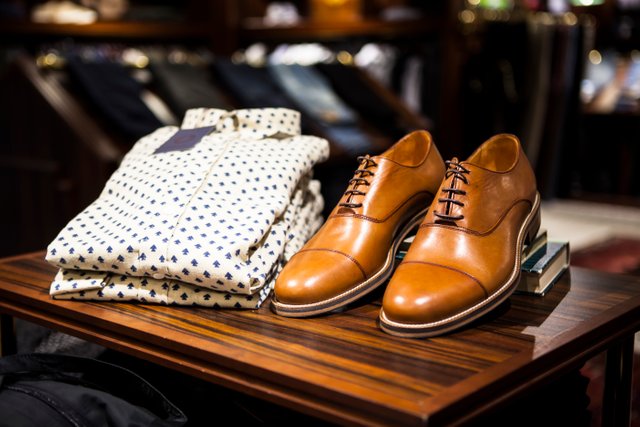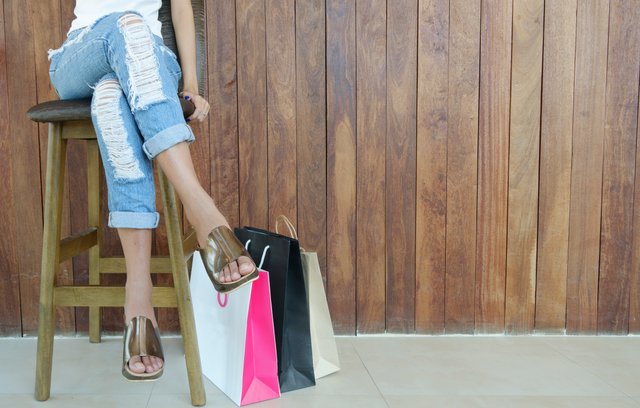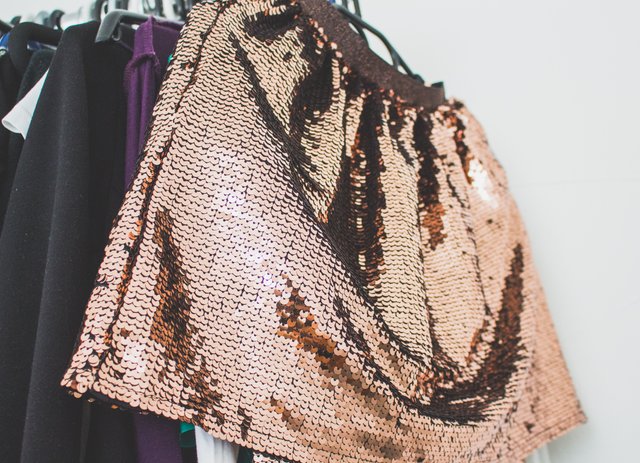
A Lot of Clothes, But Nothing to Wear...
Most of us are familiar with this problem: having a lot of clothes but somehow nothing to wear. Some time ago I was standing in front my closet filled with clothes and I was amazed to conclude that I had absolutely nothing to wear. I was determined to find out what had gone wrong here.
I took a long hard look and realized that part of the problem was how I shopped for clothes. Or more accurately: how I didn't shop for clothes. Because up until recently I had near to no strategy when it came to adding to my closet resulting in a badly functioning wardrobe. I needed a new way to shop for new clothes and make more out of the clothes I already had.
I'm not there yet, but I've definitely improved and pleased to announce that I haven't had a bad buy since. The things I have bought enable me to complement outfits I previously was unable to wear. I'm now working towards a small, versatile wardrobe filled with fewer clothes, but ones that I love and wear frequently. I think twice before accumulating more garments, but when I do I keep a few things in mind that make shopping a lot more manageable and that I'm happy to share with you.
Analyze your wardrobe
First things first: analyze your wardrobe before you go shopping. Go over your wardrobe and really analyze it. Is it made up of mainly dresses or trousers and tops. Or for men: button up shirts or hoodies? Then think of what you actually wear on a daily basis. Just because you’ve got loads of dresses or hoodies doesn’t mean you actually wear them. So if you’re a girl with a multitude of frilly dresses in your wardrobe but you actually end up wearing jeans and tank tops most of the time, you would be silly to go out and buy another dress. Unless you’ve got money to burn and shopping is more of a hobby, knowing what NOT to buy is almost as important if not more important than knowing what to buy. Obviously, if you have a job that requires you to dress a certain way that’s different, but I’m assuming you’re shopping for a leisure wardrobe here.
Be specific on what you need
So now you know you mainly wear jeans and t-shirts for example. Have another look. Maybe you’ll notice you’ve got plenty of jeans, but not as many tops. Or say you do have a sufficient amount of tops, but now autumn is kicking in, you don’t have many cardigans or jumpers to wear on top. Great, you are getting somewhere, now you know you need cardigans! But don’t just stop there, because although going shopping for cardigans seems quite specific, it really isn’t. See what cardigans you’ve got and what style and colour they are and with which tops they go. Then take the remainder of tops that are in need of a cardigan and try to make categories if there are many. Maybe the grey and burgundy ones can all be worn with a black cardigan on top. The beige and white ones might look nice combined with a light blue. So now we are really clear, we need two cardigans: one black, one blue.

Bring along garments that need a match
You can further decide on the style beforehand, but I would suggest either bringing or wearing the trickier garments that need a match. For example, a plain white t-shirt is most likely to go with a lot, but a printed burgundy one might be more difficult. I’ll continue with the cardigan example to explain my point.
In the shop, collect a variety of black and blue cardigans that appeal to you. Get some different shades, styles and lengths. Don’t rule out ones that you’re not too sure about too soon, it’s often those items that you wouldn’t have thought in the first place to work that go really well. Bring everything into the fitting room, put on the shirt in need and start trying on all the options.
It should be fun and not too stressful. You already know for sure that you need cardigans, so it’s unlikely that you’ll be wasting money on something you end up not wearing. Also choosing between a baby blue and an aqua cardigan is easier than choosing between a dress and a pair of trousers since the latter choice is solely based on what you like best over the other but with no other specific criteria. The former one is based on what looks best with an outfit in mind and if possible, what can be worn with multiple outfits (or at least it should be!).

If in doubt, don’t buy
I’m convinced that if you’re not sure about a garment, you probably don’t like it (enough) to wear it often or even ever. Unless you are bad at making any kind of decision in general, you usually know once you have put a shirt on if you like it. Maybe not straight away, maybe you have to get used to it at first or move in it for a bit, but then you’ll usually know: I either like this or I don’t like this. If you are really not sure either way, just wait. Go home and see if you regret not buying it.
In my case after the initial impulse to buy has faded, a lot of the time I realize I can perfectly life without this piece of clothing. Let’s say I found my cardigans, but there was also this one dress that I tried on and I sort-of-kinda liked but maybe didn’t really need. When I’m really not sure, I will go home and see if tomorrow I’m still thinking about that bright yellow dress. Do I have any shoes to wear with it? Is it warm enough or do I need to wear anything over it and if so, do I have something that goes with it? Many times if I’ve got absolutely nothing to go with it, I’ll decide against it because it means I will have to go out and buy several other items just to be able to wear this new one. So this new dress, however lovely, will just be one more item to not leave my closet anytime soon.
If however, it has withstand all these objections, I’m still thinking about it or it does fit in with my closet, maybe I even catch myself thinking something along the lines of “If I had that dress it would have made a perfect outfit for tonight’s dinner party”, I will go ahead and buy it. I will then repeat the process of identifying additional items I might need to wear this dress if it doesn’t fit in with my current closet and going out and finding it.

Go alone
Go alone or don’t listen too much to other people. In describing the process up until now I haven’t mentioned other people. That’s because I think in most cases, you’re better of without them when it comes to shopping. Sure, it’s nice to have company and go on a mission together, but when it comes to buying clothes, we are too easily influenced by what someone else thinks. How many times have you been convinced by someone else you look absolutely fa-bu-lous. And how many times have you actually ended up wearing that same item that you didn’t feel comfortable wearing in the first place when it’s actually hanging in your closet.
The only time when I think it’s worth considering someone else’s opinion when it comes to shopping is not when they say they like something, but rather when they say they don’t like something. When a friend or whoever you’ve taken with you shopping actually comes out and tells you something doesn’t look great on you at the risk of offending you, they are probably doing you a favour ;-)
Don’t change a winning formula
Lastly, a more general piece of advice on the risk of sounding boring: don’t change a winning formula (too much) It’s always hard to tell which clothes will end up being your favourite, but if you’ve become really fond of something and it’s still available, consider getting it in another colour or even the same colour so you can alternate and neither of them gets worn out to quickly. Plus ideally, you'll always have a clean one at hand. It doesn’t happen very often that I find a pair of trousers that is just perfect: comfortable and flattering. So when I do, I don’t mind having it in different colour ways, because I already know they look great and I’ll wear them. It also makes shopping super easy, a bit like a breeze, shall we say?
Conclusion
If you want to make shopping super easy, stick with what you know, otherwise analyse what you need and be as specific about it as you can. Bring unmatched items along to make deciding easier, but if you're still not sure give it some time. Try not to listen too much to opinions other then your own, because at the end of the day you are the person that is going to wear that piece of clothing, so ultimately you know best!



